Genocide Memorial Day (GMD) is a day focused on remembering man’s inhumanity to man. It takes place on the third Sunday of January each year. GMD was started by IHRC in 2010 to commemorate past and ongoing genocides, and to raise awareness around genocide prevention. Since then events have taken place all over the world.
We are pleased to announce its 16th annual Genocide Memorial Day, which will be held on Sunday, January 19th, 2025. This year’s theme is Resisting Genocide.
The world’s first live-streamed genocide continues in Gaza, with every day revealing fresh horrors. The claim to championing universal human rights, so blithely trumpeted by the collective West, stands exposed in all its hollowness in front of Gaza’s bomb-blasted moonscape. Even after the International Court of Justice has ruled that there is a plausible genocide in Gaza, the West stands either complicit in or indifferent to the atrocities being perpetrated by Israel. Western complicity in the Gaza genocide is nothing new. Throughout history, wherever and whenever genocidal acts have been committed, the perpetrators have made great efforts to conceal, justify or dress up their crimes.
In the face of this industrial-scale slaughter and such overwhelming odds, there is still much that local populations can do. The right of resistance is a fundamental protection gouged into the tablets of international law. It is this theme of resistance to genocide which will form the theme of our next Genocide Memorial Day.
We have some announcements for you.
Genocide Memorial Day event, London
WHEN: Sunday, 19 January 2025
TIME: 3pm-6pm
VENUE: P21 Gallery, 21 Chalton Street, Kings Cross, London NW1 1JD
This event will be streamed LIVE online on YouTube, Facebook and IHRC.TV
Refreshments will be provided
Free event
Confirmed speakers:
Professor Haim Bresheeth
Dr Ahmed Mofeed Mokhallalati
Revd Dr Stephen Sizer
Dr Ghada Karmi
Anika Wadood
Supporting organisations:
Decolonial International Network (DIN)
The Muslim Public Affairs Committee UK
Jewish Network for Palestine
The Convivencia Alliance
Bruxelles Pantheres
Inminds
Neturei Karta International
Citizens International
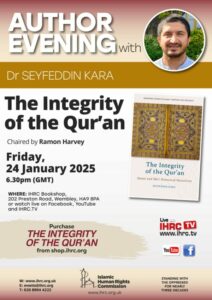 Author Evening with Dr Seyfeddin Kara: The Integrity of the Qur’an
Author Evening with Dr Seyfeddin Kara: The Integrity of the Qur’an
Join us for an author evening with Seyfeddin Kara to discuss his recent publication, The Integrity of the Qur’an: Sunni and Shi‘i Historical Narratives.
This event will be chaired by Ramon Harvey.
Purchase The Integrity of the Qur’an here
WHEN: Friday, 24 January, 2025, 6.30pm GMT
WHERE: IHRC Bookshop (202 Preston Road, HA9 8PA)
or watch live on Facebook, YouTube and IHRC.TV
Free event (no booking required).
Refreshments provided.
Prayer and wudu facilities available.
About the book:
The book explores Muslim narratives on Qurʾanic distortion through a detailed analysis of hadith using isnād-cum-matn methodology. Seyfeddin Kara uncovers the origins of claims about textual corruption, highlights the interplay between Sunni and Shiʿi traditions, and sheds light on forgery culture in early Muslim society. The work advances isnād-cum-matn analysis as a tool for dating hadiths and detecting forgeries, contributing to the study of the Qurʾan’s textual history and early Islamic debates about its integrity. Through case studies, including verses on stoning and breastfeeding, the book offers new insights into the evolution and canonization of the Qurʾanic text.
About the author:
Dr. Seyfeddin Kara, an Assistant Professor of Islamic Origins at the University of Groningen, specializes in early Islam, the Qur’an, hadith, Sunni and Shiʿi Islam, and Muslims in Europe. He holds a PhD in Islamic Studies from the University of Durham and has held a Marie Sklodowska-Curie Global Fellowship with research terms at institutions like the University of Toronto and Lund University.
Dr. Kara has received grants from the EU and Canada’s Social Sciences and Humanities Research Council, among others. He has taught at the University of Durham and Hartford International University and published extensively, including books such as The Integrity of the Qur’an (2024) and In Search of Ali ibn Abi Talib’s Codex (2018). He is currently open to supervising PhD candidates.
Our partners are on the ground in the Gaza Strip responding right now ensuring Gazans have access to essential needs such as food and have the medical supplies they need to cope with the unprecedented influx of casualties.
In the West Bank homes and other vital infrastructure are routinely demolished, and inhabitants are evicted by force. This is due to the violence, intimidation, and rejection of building permits. Schools continue to be damaged or demolished. Palestinian students are routinely harassed on their way to school, hampering their access to education.
Through our projects in Palestine (West Bank and Gaza), IHRC work with trusted and experienced local partners to deliver programmes that provide Palestinians access to essential health services and food aid. We work throughout the year and respond as quickly as possible in times of humanitarian emergency. If you would like to donate to the IHRC Trust, please click here.
WATCH: Forgotten Genocide Film Premiere and Q&A
The film ‘Forgotten Genocide‘ about the Bosnian War of 1992 – 1995 was premiered at Rich Mix in East London in 2015. The documentary was written and directed by Assed Baig, and he took questions and answers at the event, alongside Bosnian war activist and survivor Demir Mahmutcehajic and chair of the IHRC, Massoud Shadjareh. The event was curated by artist and author Hamja Ahsan. Poet Hodan Yusuf also took to the stage.
To watch the ‘Forgotten Genocide‘ film, click on the title.
Trigger Warning: The film discusses torture, sexual violence, genocide and contains some graphic images. This may be suitable for age 15 and over only.
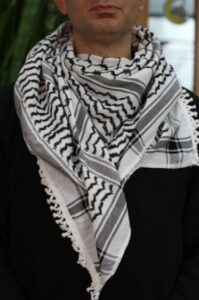 Palestinian Keffiyeh in stock!
Palestinian Keffiyeh in stock!
The keffiyeh (kufiya) is a traditional headdress worn by men from parts of the Middle East. It is fashioned from a square scarf, and is usually made of cotton. The keffiyeh is commonly found in arid regions, as it provides protection from sunburn, dust and sand. Since the 1930s Arab Revolts in Palestine, the black and white fishnet patterned keffiyeh were used as a national symbol of Palestinian Solidarity and was further popularised by Yasser Arafat’s donning of the scarf. To purchase, click here.
Manufactured in the Nabulsi factory, located in the city of Nablus.
Below are the colours currently available:
– Classic black and white
– Green and white
Below are recommended books related to genocide that are available at IHRC Bookshop:
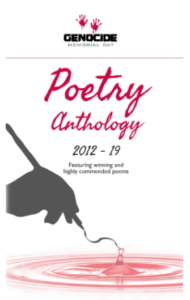 Genocide Memorial Day Anthology: 2012 – 2019
Genocide Memorial Day Anthology: 2012 – 2019
An anthology of the winners, runners-up and highly commended entries. With various contributors and an introduction by Ibrahim Sincere. Whether to memorialise, to inspire a prayer or to learn from, analyse and study, this volume brings much to reflect on, and despite its topic, a glimmer of hope that with increased understanding comes the chance of a better future. This is of interest to those who need a teaching resource on this topic, as well as those who appreciate poetry.
This anthology brings all the entries from winners, runners-up and those highly commended from 2012 – 2019 Genocide Memorial Day poetry competition in one volume. Since its first establishment in 2010, GMD events have taken place across the world, established by different organisations working on their own or as part of both the Universal Justice Network (UJN) and the Decolonial International Network (DIN). Events have taken place in Jerusalem, The Hague, Paris, Brussels, Kuala Lumpur and many other places.
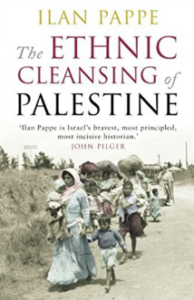 The Ethnic Cleansing of Palestine – Ilan Pappe
The Ethnic Cleansing of Palestine – Ilan Pappe
Between 1947 and 1949, over 400 Palestinian villages were deliberately destroyed, civilians were massacred, and around a million men, women, and children were expelled from their homes at gunpoint.
Denied for almost six decades, had it happened today it could only have been called “ethnic cleansing”.
Decisively debunking the myth that the Palestinian population left of their own accord in the course of this war, Ilan Pappe offers impressive archival evidence to demonstrate that, from its very inception, a central plank in Israel’s founding ideology was the forcible removal of the indigenous population. This book is indispensable for anyone interested in the Middle East.
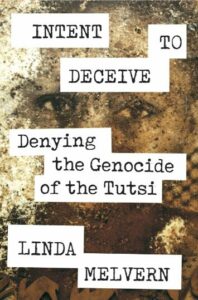 Intent to Deceive: Denying the Genocide of the Tutsi – Linda Melvern
Intent to Deceive: Denying the Genocide of the Tutsi – Linda Melvern
It is twenty-five years since the 1994 genocide of the Tutsi of Rwanda when in the course of three terrible months more than 1 million people were murdered. In the intervening years a pernicious campaign has been waged by the perpetrators to deny this crime, with attempts to falsify history and blame the victims for their fate. Facts are reversed, fake news promulgated, and phoney science given credence.
Intent to Deceive tells the story of this campaign of genocide denial from its origins with those who planned the massacres. With unprecedented access to government archives including in Rwanda Linda Melvern explains how, from the moment the killers seized the power of the state, they determined to distort reality of events. Disinformation was an integral part of their genocidal conspiracy. The génocidaires and their supporters continue to peddle falsehoods. These masters of deceit have found new and receptive audiences, have fooled gullible journalists and unwary academics. With their seemingly sound research methods, the Rwandan génocidaires continue to pose a threat, especially to those who might not be aware of the true nature of their crime. The book is a testament to the survivors who still live the horrors of the past. Denial causes them the gravest offence and ensures that the crime continues. This is a call for justice that remains perpetually delayed.
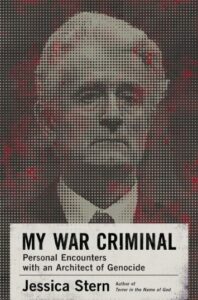 My War Criminal: Personal Encounters with an Architect of Genocide – Jessica Stern
My War Criminal: Personal Encounters with an Architect of Genocide – Jessica Stern
An investigation into the nature of violence, terror, and trauma through conversations with a notorious war criminal by Jessica Stern, one of the world’s foremost experts on terrorism. Between October 2014 and November 2016, global terrorism expert Jessica Stern held a series of conversations in a prison cell in The Hague with Radovan Karadzic, a Bosnian Serb former politician who had been indicted for genocide and other war crimes during the Bosnian War and who became an inspiration for white nationalists.
Though Stern was used to interviewing terrorists in the field in an effort to understand their hidden motives, the conversations she had with Karadzic would profoundly alter her understanding of the mechanics of fear, the motivations of violence, and the psychology of those who perpetrate mass atrocities at a state level and who like the terrorists she had previously studied target noncombatants, in violation of ethical norms and international law.
How do leaders persuade ordinary people to kill their neighbors? What is the ecosystem that creates and nurtures genocidal leaders? Could anything about their personal histories, personalities, or exposure to historical trauma shed light on the formation of a war criminal s identity in opposition to a targeted Other?
In My War Criminal, Jessica Stern brings to bear her incisive analysis and her own deeply considered reactions to her interactions with Karadzic, a brilliant and often shockingly charming psychiatrist and poet who spent twelve years in hiding, disguising himself as an energy healer, while also offering a deeply insightful and sometimes chilling account of the complex and even seductive powers of a magnetic leader and what can happen when you spend many, many hours with that person.
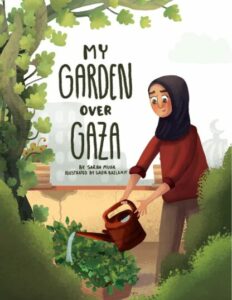 My Garden Over Gaza – Sarah Musa, illustrated by Saffia Bazlamit
My Garden Over Gaza – Sarah Musa, illustrated by Saffia Bazlamit
Noura is a strong young lady, diligently caring for her little brother, Esam, and for her father’s rooftop garden. But life in Gaza is hard even for the young. Can Noura keep working with all her heart even after losing the thing she loves the most?
Also available at IHRC Bookshop:
Layla’s Rainbow; Hope in Gaza – Yasmin Begum
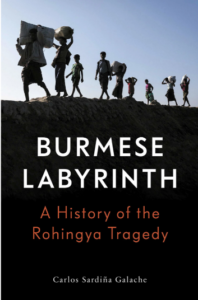 The Burmese Labyrinth – Carlos Sardina Galache
The Burmese Labyrinth – Carlos Sardina Galache
A first-hand account of the complex, bloody history of Mayanmar: and the origins of the ethnic cleansing of the Rohingyas. In 2011, Burma/Myanmar embarked in a democratic transition from a brutal military rule that culminated four years later, when the first free election in decades saw a landslide for the party of celebrated Nobel prize-winner Aung San Suu Kyi. Yet, even as the international community was celebrating a new dawn, old wars were raging in the northern borderlands and a crisis was emerging in western Arakan State, as the regime intensified its oppression of the vulnerable Muslim Rohingya community.
The trigger of the latter was a series of episodes of intercommunal violence between Muslims and Buddhists in 2012, in which the army and police took sides attacking the former.
By 2017, the conflict had escalated into a military onslaught against the Rohingya that provoked the most desperate refugee crisis of our times, as over 750,000 of them fled their homes to neighbouring Bangladesh.
In The Burmese Labyrinth, journalist Carlos Sardiña Galache, gives the in depth story of the country, combining reportage and history. Burma has always been an uneasy balance between multiple ethnic groups and religions. He examines the deep roots behind the ethnic divisions that go back prior to the colonial period, and so shockingly exploded in recent times. This is a powerful portrait of a nation in perpetual conflict with itself.
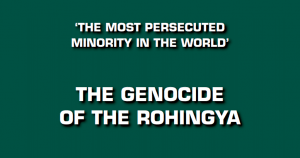 READ: IHRC REPORT: ‘The most Persecuted Minority in the World’: The Genocide of the Rohingya
READ: IHRC REPORT: ‘The most Persecuted Minority in the World’: The Genocide of the Rohingya
This report, published in 2018, focuses on the way in which the international crime of genocide is being committed against the Rohingya with impunity by the state of Myanmar, in particular, its military. It also details how crimes against humanity are being perpetrated. The Islamic Human Rights Commission has collected evidence from Rohingya refugees in Bangladesh regarding atrocities committed on and around 25 August 2017.
The report also considers the history of persecution of the Rohingya, contextualising the international crimes that have and are currently being committed. To read the full report, please click on the above heading.

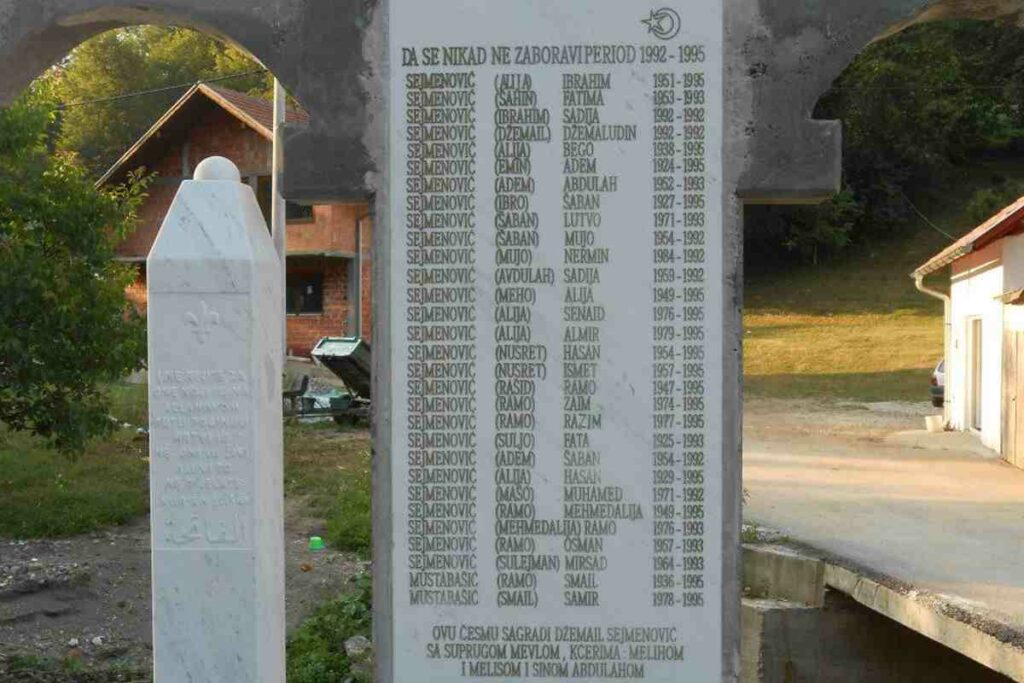
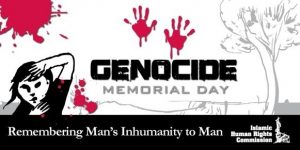 About the GMD 2025 event
About the GMD 2025 event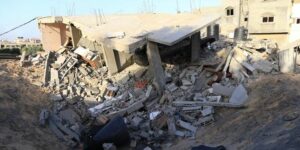 Palestine Appeal
Palestine Appeal




